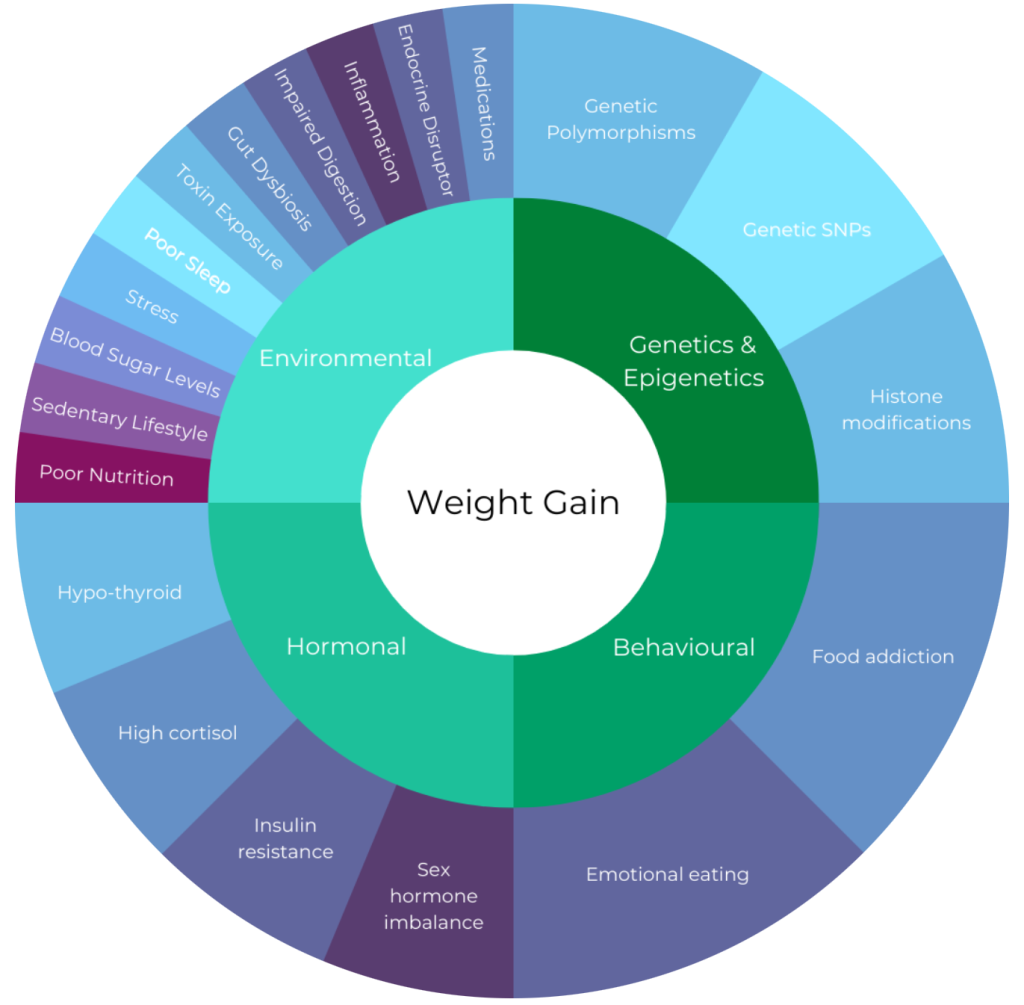Weight Loss
- Healing Nutrition: Bespoke Food Plans & Targeted Supplementation to Restore Health & Promote Weight Loss
- Targeted Therapy: Addressing Emotional Eating, Body Image Issues & Other Psychological Factors That Can Impact Weight Loss
- Weight Loss Medication: Comprehensive Weight Loss Plans That Include GLP-1 Medication
CELEBRATING 20 YEARS IN PROVIDING EXCELLENT HEALTHCARE
Longevity Weight Rebalancing
If you’re thinking beyond ‘quick weight loss’ and towards long-term health, this package is for you. Our Longevity Weight Rebalancing pathway combines high-level nutrition support with a 5-day ProLon® fasting-mimicking programme and 2-weeks of a CGM for blood glucose insights, so you can see exactly how your lifestyle is impacting your metabolism.
This package is designed to help you:
- Rebalance weight in a safe, structured and supported way
- Improve metabolic health markers like blood sugar and cravings
- Reset and cleanse your system, rebooting taste and intuitive eating
- Build habits that protect your future health, not just the next few weeks
Package investment: £700
What’s Included: 2-hour nutrition bundle • 5-day ProLon® • 2 weeks CGM (constant glucose monitor)
WEIGHT LOSS
Find Balance, Restore Health, Lose Weight
At WeightMatters, our experienced team of specialists understands that weight loss is a deeply personal and often challenging journey. For nearly 20 years, we’ve supported countless clients in overcoming the common hurdles that can stand in the way of achieving weight loss goals. These challenges often include:
- Emotional Eating: Using food to cope with stress, anxiety, or other emotions.
- Unhealthy Habits: Struggling to break free from ingrained dietary and lifestyle patterns.
- Hormonal Imbalances: Experiencing hormonal fluctuations that impact metabolism and weight regulation.
- Medical Conditions: Managing underlying health issues that contribute to weight gain.
- Lack of Support: Feeling isolated and unsupported throughout the weight loss process.
That’s why we offer a comprehensive, multi-disciplinary approach to weight loss, providing a variety of evidence-based solutions tailored to your unique needs and circumstances.

NUTRITION
We create personalised meal plans, help you set realistic and achievable goals, and provide guidance on making sustainable dietary changes.

THERAPY
We help you manage emotions without food, create a positive supportive mindset, and build resilience as you develop a healthier relationship with food.

WEIGHT LOSS MEDICATION
We can prescribe and manage weight loss medications, monitor your progress, and support other health conditions on your journey.

BARIATRIC SURGERY
We offer surgical options for those who qualify and are seeking a more intensive and long-lasting weight loss intervention.
We believe that sustainable weight loss is achievable with the right support and guidance. Our team is dedicated to providing you with compassionate care and empowering you to make lasting changes that will improve your health and wellbeing.
Take the first step towards a healthier you. Contact us today to learn more about our personalised weight loss programmes, and start your transformative journey.
TAKE CONTROL OF YOUR HEALTH TODAY – WE ARE HERE TO HELP
Struggling with weight and eating challenges? You don’t have to face it alone.
Our compassionate team is ready to listen, support, and guide you toward a healthier, happier life.
Book your free call now and take the first step.
OUR FEES
Our initial consultation is free of charge, with health coaching sessions starting from £90, therapy sessions at £120, and nutrition consultations from £200.
Health packages and multi-session bundles available – we’ll guide you to the most suitable option when we speak.
MEET JACK & HEAR HIS STORY
Jack describes how he has changed his mindset and eating behaviours, to find new confidence in himself and his ability to manage his weight.
Sabine – Do You Resonate With Her Story?
Sabine’s weight had been a constant struggle since the birth of her children, who are now teenagers. The hormonal fluctuations of pregnancy and the subsequent demands of motherhood had left her with lingering weight that refused to budge.
Emotional eating had become a coping mechanism for the stresses of family life, and unhealthy habits had crept into her lifestyle, making it difficult to regain control.
While Sabine didn’t believe she had any deep-seated psychological issues, she recognized the need for a structured and supportive approach to weight loss. She was determined to find a weight loss clinic that offered evidence-based programs and the expertise of qualified professionals. The idea of losing 10kg and achieving a healthy weight felt both realistic and exciting, but she knew she couldn’t do it alone.
Discovering a clinic that offered nutritional guidance, along with the option of weight loss medication prescribed and monitored by a Private GP, gave Sabine the confidence she needed. Knowing that psychological support was available if she needed it provided an added layer of comfort.
She was eager to work with a nutritionist to establish healthier eating habits and was open to exploring medication if it could help her reach her goals. The prospect of finally achieving a healthy weight and improving her overall wellbeing filled her with a renewed sense of hope and determination.
Why Choose WeightMatters?
WeightMatters has been supporting clients with successful weight loss for nearly 20 years. Here are some of the different approaches we can draw on to support our clients in achieving successful weight loss:
- Functional Medicine: We use functional testing to create personalised treatment protocols to identify and address the root causes of your weight issues.
- Healing Nutrition: Our bespoke food plans and targeted supplementation will help restore your health and assist in weight loss.
- Integrated Care: Our multidisciplinary approach to weight loss includes medical, psychological, and nutritional support to address the complex factors involved.
- Hormone Balancing: Our expertise in addressing hormonal imbalances through nutrition and lifestyle interventions will optimise your hormones for successful weight management.
- Blood Sugar Balancing: Through dietary and lifestyle changes, we will help you manage your blood sugar levels to improve your metabolic health and support sustainable weight loss.
- Gut Health Optimisation: We can improve your gut microbiome diversity and function, which are essential for weight management.
- Psychological Support: Our therapy and counselling services can help you address emotional eating, body image issues, and other psychological factors that can impact weight loss.
- Weight Loss Medication: When appropriate, we can offer medical supervision and prescription of weight loss medication, as part of a comprehensive weight loss plan.
- Bariatric Surgery: For those who qualify, we can provide surgical options for weight loss.
- Functional Testing: We utilise functional tests to assess hormone levels, gut health, and other biomarkers to develop the most effective personalized treatment plans.
We take a holistic and personalised approach to weight loss, addressing both the physical and psychological aspects of the journey.
It’s Time To Heal. Call us today and find out how we can create a personalised weight loss programme for you.

FACTORS DRIVING WEIGHT GAIN
There are multiple factors that can drive weight gain, and in turn make weight loss more challenging. Our bespoke programmes will create opportunities for your body, health and mind to rebalance, which in turn promotes healthy weight loss and weight management.
Weight Loss Treatment
At WeightMatters, we understand that successful weight loss requires a personalised and comprehensive approach. Our team of experts will work with you to create a tailored program that addresses your unique needs and challenges, combining the best of medical science, nutritional guidance, and psychological support.

NUTRITION
Nourish your body and achieve your weight loss goals with our personalised meal plans and expert dietary advice.

THERAPY
Develop a healthier relationship with food and overcome emotional eating patterns with our compassionate and experienced therapists.

PRIVATE GP
Receive expert medical guidance, coaching and support on your health, including weight loss medication when appropriate.

BARIATRIC CONSULTATION
Explore surgical weight loss options with our experienced bariatric consultants for a solution to support a transformation in your quality of life.
Take the first step towards achieving your weight loss goals, and discover the power of our comprehensive and tailored weight loss programmes.
Contact us today to schedule a consultation, and take the first step towards a healthier, happier you.
It’s Time To Heal.
Nutrition
Here are some interventions our nutrition team may use to support steady, safe, and realistic weight loss:
- Personalised Meal Plans – Tailored to individual needs, preferences, and dietary restrictions, ensuring nutritional balance and portion control.
- Calorie Awareness & Management – Educating clients on calorie intake and expenditure, and guiding them on making informed food choices.
- Macronutrient Balance – Focusing on the right balance of carbohydrates, protein, and fats to optimise metabolism and promote satiety.
- Mindful Eating – Encouraging clients to pay attention to hunger cues, eat slowly, and savor their food, promoting better portion control and enjoyment of meals.
- Behavior Modification – Helping clients identify and change unhealthy eating habits and patterns, and develop sustainable lifestyle changes.
- Regular Exercise – Promoting physical activity as an essential component of weight management, and providing guidance on incorporating exercise into daily life.
- Support & Accountability – Offering ongoing support, motivation, and accountability through regular check-ins.
- Sleep & Stress Management – Educating clients on the importance of sleep and stress management for weight loss and overall health, and providing strategies for improvement.
- Gut Health Optimization – Addressing gut health through dietary interventions and probiotics, recognizing its impact on digestion, metabolism, and weight.
- Food Sensitivity & Allergy Management – Identifying and addressing food sensitivities and allergies to reduce inflammation and optimise digestion.
It’s important to remember that these interventions are most effective when combined with a holistic approach that addresses the individual’s unique needs and challenges.
Therapy
Here are some interventions our therapy may use to support steady, safe, and realistic weight loss, when working collaboratively with our nutrition team.
- Cognitive Behavioral Therapy (CBT) – Identifying and changing negative thought patterns and behaviors around food and body image, and developing healthier coping mechanisms.
- Motivational Interviewing (MI) – Enhancing intrinsic motivation and commitment to change by exploring and resolving ambivalence about weight loss.
- Mindfulness-Based Approaches – Cultivating awareness of hunger cues, emotional states, and eating behaviors to promote mindful eating and reduce emotional eating.
- Acceptance & Commitment Therapy (ACT) – Encouraging acceptance of difficult emotions and thoughts, while committing to values-driven actions that align with weight loss goals.
- Dialectical Behavior Therapy (DBT) – Building skills for emotional regulation, distress tolerance, and interpersonal effectiveness to manage emotional eating and impulsive behaviors.
- Habit Tracking & Behavior Modification – Monitoring food intake, exercise, and emotions to identify patterns and triggers, and developing strategies for behavior change.
- Goal Setting & Self-Monitoring – Setting realistic and achievable weight loss goals, and tracking progress to maintain motivation and adjust strategies as needed.
- Stress Management Techniques – Teaching relaxation techniques, mindfulness practices, and coping skills to manage stress and reduce emotional eating.
- Addressing Body Image & Self-Esteem – Exploring and challenging negative body image and self-esteem issues, and promoting self-acceptance and body positivity.
Relapse Prevention & Support – Developing strategies to anticipate and manage setbacks, and providing ongoing support and encouragement to maintain long-term success.
Medical
Our private GP can prescribe GLP-1 weight loss medications, and support clients on safely using them as a tool in a wider multi-disciplinary approach to weight loss.
Initial Assessment & Ongoing Monitoring
- Conduct a comprehensive medical history and analysis of current health status and symptoms, to assess the patient’s suitability for GLP-1 medication and identify any potential contraindications or comorbidities.
- Monitor the patient’s progress regularly, check for any side effects, and adjust the medication dosage or treatment plan as needed to ensure optimal results and safety.
Personalised Lifestyle Counselling
- Provide tailored guidance on healthy eating habits, portion control, and mindful eating to complement the effects of the medication.
- Encourage regular physical activity, better sleep management and reduced stress to optimise for successful weight loss.
Education & Support
- Educate patients about the mechanism of action, potential benefits, and side effects of GLP-1 medication.
- Set realistic expectations for weight loss and emphasise the importance of long-term lifestyle changes.
- Offer ongoing support and motivation to help patients adhere to their treatment plan and achieve their weight loss goals.
Mental Health Support
- Screen patients for mental health issues such as depression, anxiety, or eating disorders.
- Refer patients to our therapy or psychiatry teams to address any underlying psychological factors that may be hindering weight loss.
At WeightMatters, we believe a multidisciplinary approach that combines medication, lifestyle changes, and psychological support is crucial for achieving sustainable weight loss and improving overall health and wellbeing.
Get help today
Start your healing journey
Contact us
Take the first step, reach out and talk to us.
You can refer yourself for treatment, or get a referral from a healthcare professional.
Call us on 020 7622 7727, email us a question or book a call.
Time to start
Share your experience
Our friendly and experienced team will listen carefully to your reason for contacting us.
They will ask some questions and match you to the service and practitioner that best fits your needs.
Time to ask
Your assessment
Your journey starts with your initial assessment session.
Your practitioner will explore your current situation, ask about your change goals, and create your bespoke treatment plan.
Time to understand
Treatment, healing & recovery
When you have agreed your treatment plan, you will meet with your practitioner / team to support your recovery.
We will support you every step of the way as you create a healthier relationship with weight, food and your body.
Time to heal
WEIGHT MANAGEMENT – GETTING STARTED
We believe it is important for clients to begin their journey by focusing on the area most impacting their health. Some might initially start with nutritional consultations to establish healthy eating plans and a better understanding of which foods will support their health goals.
If you feel your mindset and beliefs need challenging and rewiring, then starting with our therapy team may be sensible.
As you progress through your weight management journey, additional services can be seamlessly integrated into your plan. Our Holistic Weight Loss: Reframe programme allows you to blend both our psychology and nutrition services, and our Weight Loss Medication packages provide support with both our medical and nutrition teams.
We understand that effective weight management needs to be both personalised and comprehensive. Let us take the time to understand your health goals, and develop a programme that works in the structure of your daily life.
It is time to feel hopeful, heal, and start your journey to recovery.
Call us now, or book a free assessment call with our friendly client services team, who will answer any questions you have.
ARE YOU STRUGGLING WITH YOUR WEIGHT?
Many people choose to work with us, as we listen with compassion to your struggle with weight. It allows us to build a bespoke treatment solution that works for you.
IT’S TIME TO START YOUR HEALING JOURNEY
You can discover our clear pricing structure.
SERVICES WE RECOMMEND FOR WEIGHT LOSS
Here are the WeightMatters services we recommend to support weight loss.
NEURODIVERSITY POSITIVE PRACTICE
We have created a healthcare space where every brain is understood, respected and supported.
IF IT FEELS MORE COMFORTABLE, EMAIL US
Do you have a question about our treatment and support?
Leave your details below, and we will come back to you with a personalised response.
